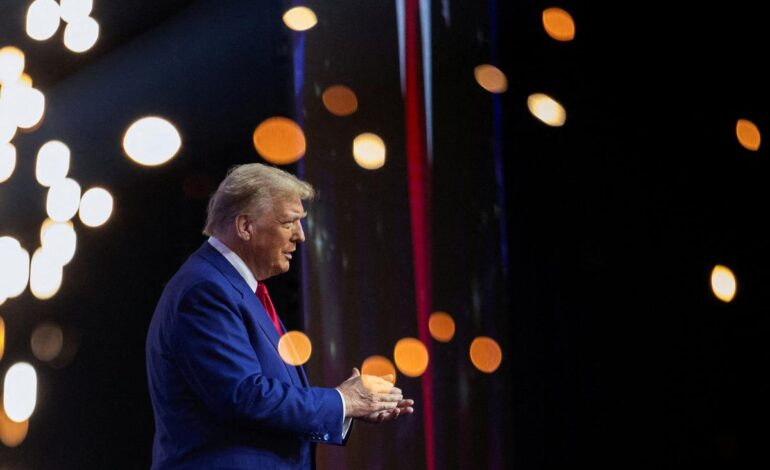
Trump wins legal battle as judge dismisses election interference case
A judge has agreed to dismiss Donald Trump’s 2020 election interference case. President-elect Trump faced charges related to his handling of classified documents and his efforts to overturn his 2020 election loss, which ultimately led to the January 6th attack on the U.S. Capitol.
On Monday, Special Counsel Jack Smith filed motions to drop all federal charges against President-elect Donald Trump concerning his mishandling of classified documents and his attempt to reverse the 2020 election results. Hours later, U.S. District Judge Tanya Chutkan granted Smith’s motion to dismiss the January 6-related indictment, officially ending the case that accused Trump of unlawfully conspiring to overturn his 2020 loss to President Joe Biden.
Trump was first indicted in June 2023 in federal court in Miami on 37 felony counts related to mishandling classified documents he took from the White House to his Florida home. The charges included willful retention of national defense information, making false statements, and conspiracy to obstruct justice. A Florida judge dismissed the case, though Smith’s office had sought an appeal.
Trump was also separately indicted on four felonies in August 2023 for his efforts to overturn the 2020 election results: conspiracy to defraud the United States, conspiracy to obstruct an official proceeding, obstruction of and attempt to obstruct an official proceeding, and conspiracy against rights.
The case was delayed for months as Trump’s legal team argued that the case should be dismissed for various reasons, including that a former president cannot be prosecuted for actions taken while in office.
Trump has claimed the prosecutions were politically motivated. He has never publicly conceded that his election claims were false, and he pleaded not guilty in both federal cases.
The federal indictments against Trump marked an extraordinary moment in American history—representing the first-ever accusation that a sitting president sought to illegally cling to power, mishandled classified information, and tried to obstruct a federal investigation.
Their dismissal is also historic. Fifty years after Congress forced Richard Nixon to resign the presidency due to criminal conduct in office, half of American voters chose to return Trump to the presidency.
Trump’s election victory means that the Justice Department’s longstanding position that a sitting president cannot be charged with a crime will apply to him once he takes office on January 20, 2025.
“That prohibition is categorical and does not depend on the gravity of the crimes charged, the strength of the government’s evidence, or the merits of the prosecution, which the government fully supports,” Smith’s office wrote in Monday’s filing.
“The government’s position on the merits of the defendant’s prosecution has not changed. But the circumstances have,” the special counsel’s office added.
This legal stance from the DOJ’s Office of Legal Counsel is the same one that helped Trump avoid charges during Robert Mueller’s special counsel investigation while he was president. Mueller’s team decided they could not conclude whether Trump committed a crime, as they could not charge a sitting president.
Now, the same OLC opinion is preventing Smith’s case from proceeding.
After Trump’s re-election, the special counsel’s office found itself caught between two major national interests: the Constitution’s requirement that a president must not be unduly hindered in carrying out their duties, and the nation’s commitment to the rule of law, which holds that “no man in this country is so high that he is above the law.”
Smith and his team are expected to resign before Trump takes office. Special counsel regulations require Smith to file a report to the attorney general explaining his charging decisions before he steps down.
Support from conservative judges was instrumental in Trump’s victory in the case, particularly with a ruling on presidential immunity. The Supreme Court took months to issue its decision, making it impossible for Judge Chutkan, who oversees the case, to conduct a trial before the election.
In a July ruling, the justices granted the president broad immunity from prosecution, asserting that all of a president’s interactions with the attorney general were “absolutely immune.” Liberal justices dissented, arguing that this ruling gave presidents the power to order federal criminal investigations of their political rivals without legal consequences.
Two weeks later, Trump-appointed federal judge Aileen Cannon dismissed all charges related to Trump’s mishandling of classified documents and obstructing the investigation. Cannon’s ruling was widely criticized by legal experts and was appealed by Smith’s office.
In August, a new federal grand jury indicted Trump on the same four charges related to the election case, alleging that Trump’s false claims of widespread voter fraud were “unsupported, objectively unreasonable, and ever-changing,” and that he “knew they were false.” But Trump’s re-election has now ended Smith’s ability to move forward with those charges.
Trump’s spokesman, Steven Cheung, said in a statement, “Today’s decision by the DOJ ends the unconstitutional federal cases against President Trump and is a major victory for the rule of law. The American people and President Trump want an immediate end to the political weaponization of our justice system, and we look forward to uniting our country.”
Many January 6 defendants have expressed regret for falling for Trump’s falsehoods, which were echoed by Trump’s allies, Republican members of Congress, and conservative social media influencers.
The Justice Department is now focused on arresting the “most egregious” rioters before Trump returns to office. Trump has indicated that he plans to pardon some of the January 6 rioters, whom he has called “warriors,” “unbelievable patriots,” political prisoners, and “hostages.”
He is expected to walk through the lower west tunnel, where some of the worst violence of January 6 took place, to be sworn in as president on January 20, 2025.